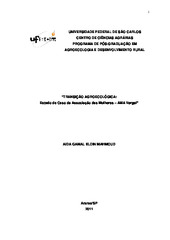| dc.contributor.author | Mahmoud, Aida Gamal Eldin | |
| dc.date.accessioned | 2016-06-02T18:57:34Z | |
| dc.date.available | 2011-04-19 | |
| dc.date.available | 2016-06-02T18:57:34Z | |
| dc.date.issued | 2011-02-03 | |
| dc.identifier.citation | MAHMOUD, Aida Gamal Eldin. Agroecological transition: case study of a women´s association - AMA vergel. 2011. 124 f. Dissertação (Mestrado em Ciências Agrárias) - Universidade Federal de São Carlos, Araras, 2011. | por |
| dc.identifier.uri | https://repositorio.ufscar.br/handle/ufscar/104 | |
| dc.description.abstract | The agriculture modernization and industrial growth coupled with the implementation of public policies has led to a major exodus from the country, notably between the 60 s and 80 s when around 13 million people have fled the field and headed towards the urban centers. This equates to 33% of rural population in the early 60's. The rural settlements emerge as an opportunity to return to work the land, and in addition to that, the application of agroecological principles emerges as a great option to conventional agriculture. The objective of this research was to analyze the association of agroecology women of Vergel (AMA Vergel) during a process of agroecological transition, rescuing the life history of the group members and the history of the group emergence as well. The possibilities and limitations that exist within the group were analyzed from the perspective of solidary economy. We studied the ownership and involvement of research actors on learning concepts in agroecology. There was a strengthening of group work which enhances the autonomy and recognition of that, and moreover, the self-esteem of female members of the group is higher, despite facing opposition inside and outside the family. The performance of various institutions working with the group resulted in a large accumulation of information, but as they are not attuned to each other and had different temporal perspective from the group, they did not achieve the expected success. In recent years the group has expanded their contacts with other agroecology realities. An example of good association of agroecological knowledge, related to agricultural practices and life in society, could be seen on small farm Nova Vida . Women who join to work in group look for strength to face the adversities and an opportunity to improve the quality of their lives and of their families. | eng |
| dc.description.sponsorship | Financiadora de Estudos e Projetos | |
| dc.format | application/pdf | por |
| dc.language | por | por |
| dc.publisher | Universidade Federal de São Carlos | por |
| dc.rights | Acesso Aberto | por |
| dc.subject | Agroecologia | por |
| dc.subject | Assentamento rural | por |
| dc.subject | Trabalho em grupo | por |
| dc.title | Transição agroecológica: estudo de caso da associação das mulheres - AMA Vergel | por |
| dc.title.alternative | Agroecological transition: case study of a women´s association - AMA vergel | eng |
| dc.type | Dissertação | por |
| dc.contributor.advisor1 | Ferraz, José Maria Gusman | |
| dc.contributor.advisor1Lattes | http://http://lattes.cnpq.br/3851804858390996 | por |
| dc.description.resumo | A modernização da agricultura aliado ao crescimento industrial e a implementação de políticas públicas levou à ocorrência de um grande êxodo rural no país, notadamente entre as décadas de 60 e 80 quando aproximadamente 13 milhões de pessoas abandonaram o campo e rumaram em direção aos centros urbanos. Isso equivale a 33% da população rural do início da década de 60. Os assentamentos rurais surgem como uma oportunidade de retorno ao trabalho na terra e, para fazer frente á agricultura convencional altamente demandante de insumos e capital, a aplicação dos princípios agroecológicos destaca-se como uma grande opção entre os assentados. O objetivo desta pesquisa foi analisar a Associação das Mulheres Agroecológicas do Vergel (AMA Vergel) no processo de transição agroecológica. Resgatou-se a história de vida das integrantes do grupo, bem como o histórico do surgimento do grupo. As possibilidades e os limites existentes dentro do grupo foram analisados dentro da perspectiva da economia solidária. Foi estudada a apropriação e envolvimento dos atores da pesquisa com os conceitos trabalhados na agroecologia. Verificou-se um fortalecimento do trabalho em grupo, o que melhora a autonomia e o reconhecimento do mesmo, além disso, a auto-estima das mulheres integrantes do grupo está mais elevada, apesar do enfrentamento de resistência dentro e fora do núcleo familiar. A atuação de várias instituições trabalhando com o grupo resultou em um grande acúmulo de informações, mas que por não estarem sintonizadas entre si e com perspectiva temporal diferente do grupo, não obtiveram o êxito esperado. Nos últimos anos o grupo AMA Vergel vem ampliando seus contatos com outras realidades agrícolas de vertente agroecológica. No Sítio Nova Vida pôde ser observado um exemplo de boa associação do conhecimento de base agroecológica, tanto referentes às práticas agrícolas como à vida em sociedade. As mulheres ao se unirem no trabalho em grupo buscam força para enfrentar as adversidades do dia a dia e oportunidade de melhorar a qualidade de suas vidas e da de seus familiares. | por |
| dc.publisher.country | BR | por |
| dc.publisher.initials | UFSCar | por |
| dc.publisher.program | Programa de Pós-Graduação em Agroecologia e Desenvolvimento Rural - PPGADR-Ar | por |
| dc.subject.cnpq | CIENCIAS AGRARIAS | por |
| dc.contributor.authorlattes | http://lattes.cnpq.br/8022359379919573 | por |
